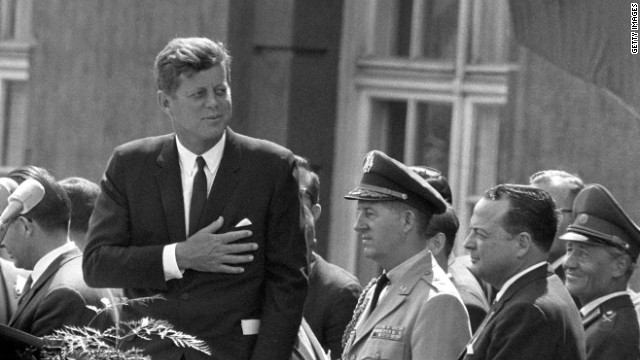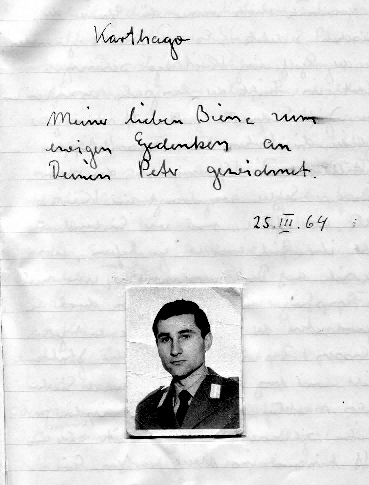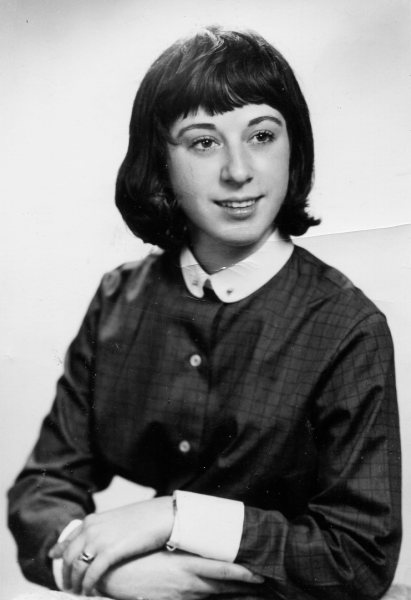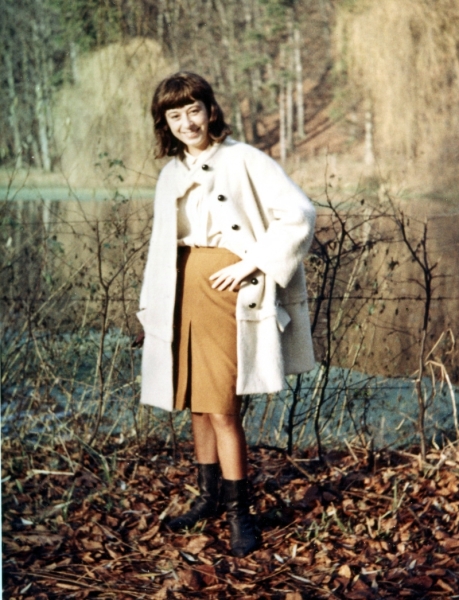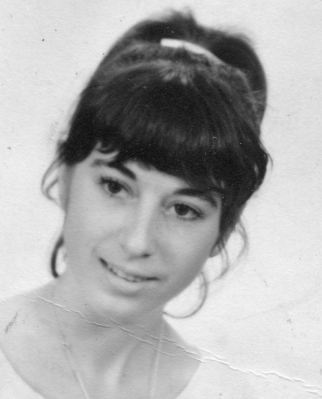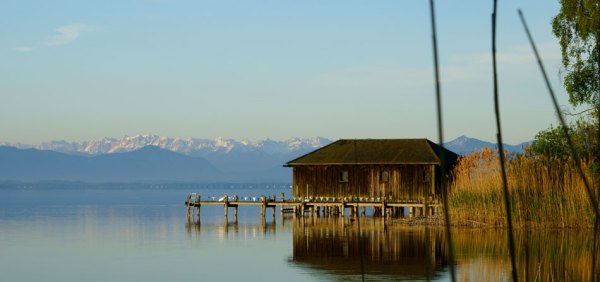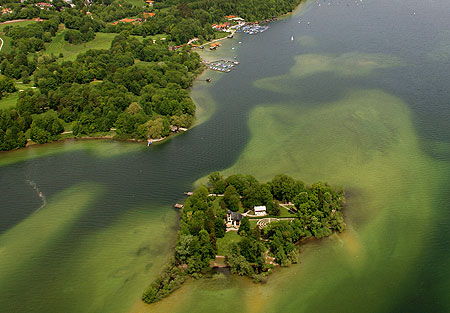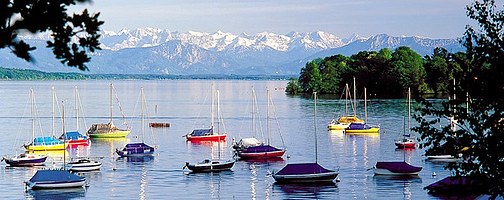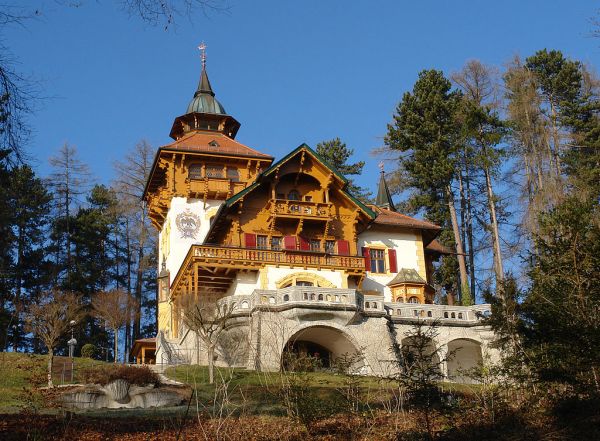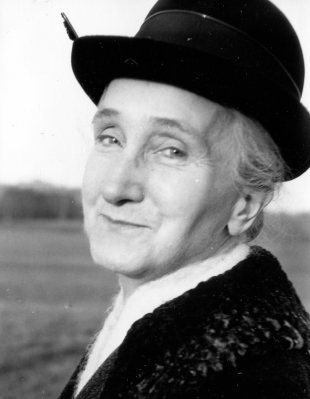Sorrows of Young Peter
“The Five W’s of Life:
WHO you are is what makes you special. Do not change for anyone.
WHAT lies ahead will always be a mystery. Do not be afraid to explore.
WHEN life pushes you over, you push back harder.
WHERE there are choices to make, make the one you won’t regret.
WHY things happen will never be certain. Take it in stride and move forward.”Anonymous
With the transfer to the Falckenstein Barracks in Koblenz things were looking up for me. Our room was only slightly smaller than the one we had at the basic training camp, but instead of fifteen men only ten would share the sleeping facilities. The only drawback at the beginning was that the windows were facing one of the major north-south traffic arteries. The noise from the trucks and cars was considerable and lasted right through the night. At first I thought I could not sleep at all in a room inundated by the roar of engines and swishing of tires even with the windows closed. But little by little I got used to it and like the loud surf at the seashore at the Baltic Sea it no longer bothered me after a few days. I am sure that if the din below had suddenly stopped the silence would have woken me up.
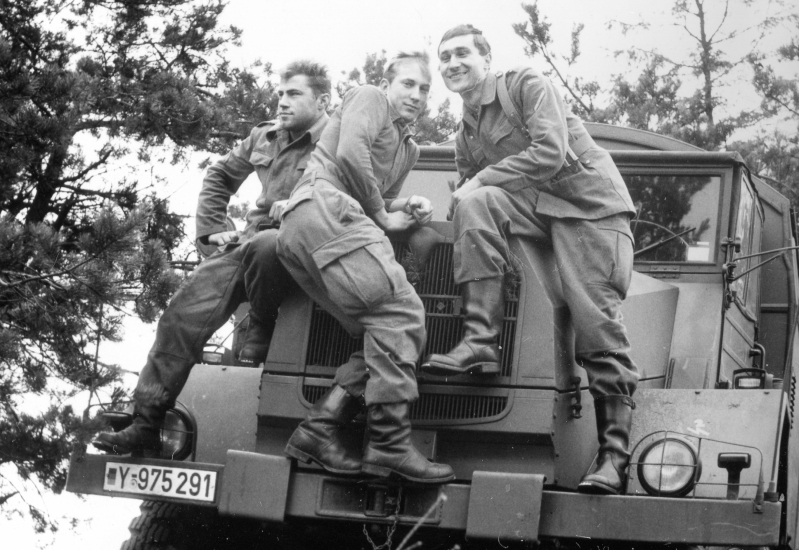
Peter on the right with truck driver and communication assistant
Also the pace of our daily routines significantly slackened. We still had to line up and stand at attention for the morning and noon announcements. But there were now more instructional sessions both theoretical and practical with emphasis on specialization depending to which of the three major groups we belonged in the signal corps. The linemen were responsible for connecting the various field centres during military exercises. They had from a physical perspective the toughest job. Rain or shine, heat or cold, their task was to unroll miles of cable and when the maneuver was over roll it back onto the empty drums on their backs. I had the good fortune that I was assigned to the second group. I was working inside a Mercedes truck packed with electronic gear, which I had learned to operate during my training sessions. The linemen would arrive huffing and puffing after a strenuous march through forests and fields. All I had to do was to connect the wires to the carrier frequency sets, call up my counterpart at the other end and tune up the line so that it would be capable of carrying several channels at once. It was the latest technology in those days, but miniscule by today’s standards, where thousands of telephone calls can be placed over a single wire or a wireless connection. The third and most prestigious group consisted of the wireless operators trained to set up and maintain point-to-point, line-of-sight connections. To be useful, the linemen also had to connect them by cable to our stations. I liked maneuvers of this kind, especially the ones that lasted a whole week, and often as a bonus resulting in an extra long weekend pass. It was during these action filled times that I began to reflect on the career proposal the captain had made to me less than a month ago. During guard duty, which I had to do every three weeks or so, whenever my turn was announced on the company bulletin board, I had also some time to do some thinking on the purpose and meaning of military service in a world that lived under the spell of the Cold War and under the threat of a massive attack by communist forces to take over Western Europe. While walking inside the fenced perimeter of our barracks I was searching for answers to those questions that popped up in my mind during the boring two-hour shifts in the dead of night. I composed a poem, which I included here in the hope that not too much is lost in translation.
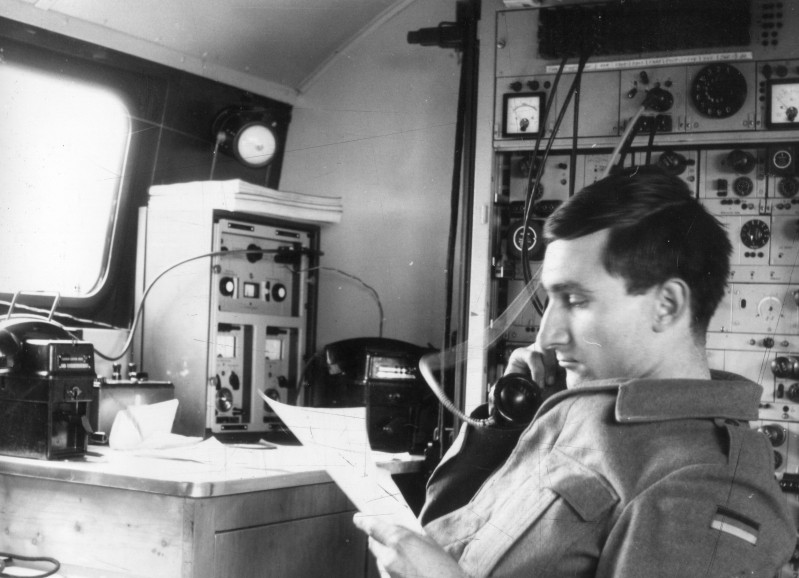
Peter at work at his ‘home’ packed with electronic gear
Night Watch
Drearily the rain is falling.
I am walking in monotone even steps.
Nothing is moving in the semi-darkness.
Radio trucks like monsters are staring at me.
They appear to mock me,
Indeed threaten to devour me.
You servants of men!
To what end are you being abused?
Abused?
Aren’t you defending freedom and peace?
If you prevent that
For which you have been built,
Then sacred is your presence.
Yeah, just stare at me!
Your power brings me joy.
And I am walking past them
In monotone even steps.
To avoid war, an army must be strong so that an aggressor will understand that nothing would be gained and much more would be lost. It was the balance of power that kept the peace in the Cold War period, in which I was a soldier.
Discussion with a Friend on the Nature of Love
Mother had just returned from a visit to Gerry, daughter-in-law Martha and her one-year old grandson Wayne in Medicine Hat, Alberta, Canada. It so happened that I was on a ten-day leave and spent a relaxing vacation with her and Aunt Mieze, Aunt Lucie and Uncle Günther at their wonderful house in Watzenborn-Steinberg (Pohlheim). Mother talked a lot about her exciting trip to Canada. The proud grandmother had traveled with Gerry’s family over the Rocky Mountains all the way to beautiful British Columbia. Gerry described the countryside with its lush valleys, wild rushing streams, spectacular scenery and mild climate as God’s country. True to a long family tradition in the Kegler branch of the family, Mother wrote a report of her experiences of her journey to the land of the beavers.
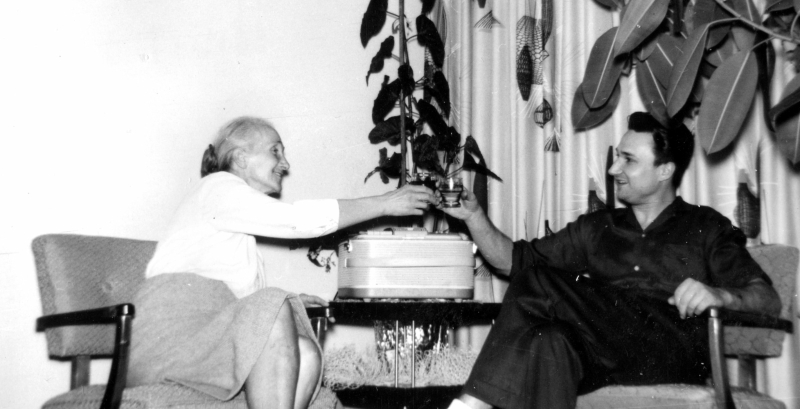
Mother Erika Klopp with Gerry on her visit to Canada
Biene’s school holidays were approaching. In 1962 her family had spent their vacation on the Mediterranean island of Corsica. Now they were planning to spend a couple of weeks at Lake Ammer in Bavaria. Even though I felt my love for Biene was getting stronger with every passing week, I did not openly declare it to her, because I erroneously assumed that she would already know. When she once asked me if I had ever been in love, I missed the golden opportunity to reveal what was on my heart. Instead I used a ride on my brand-new bicycle as a metaphor to describe in the most abstruse way the chaotic state of my inner being. I described how I got lost in the woods. I did not know which way to choose to get out. I dug deep into my psyche, too deep for comfort. Not yet realizing that the good and the evil lie close together within each and every human being, I criticized the world for failing to give me directions. Blind as a bat to my own flaws and weaknesses, I declared the entire world with its political systems, the church, and the army rotten and corrupt. These pathetic meanderings of my mind did very little to express my true feelings for her and would have been better left unsaid.
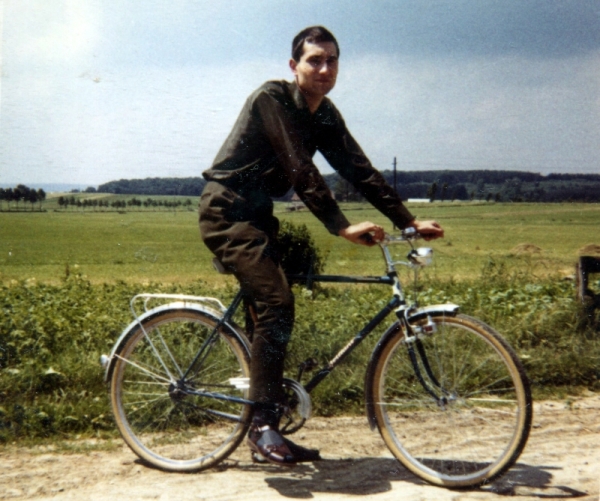
Peter on his Bicycle
For the remaining three or four days I went on a bicycle tour with Dieter, my new army buddy. We traveled first up the River Moselle, then climbed up into the Eifel Mountains and stopped at a beautiful campsite named Pomerania, which reminded me of my grandparents’ lost home province in the east. At nightfall we sat in front of our tent looking at the rising moon in a cloudless sky. The day before I had bought a bottle of Moselle wine, a Riesling well known for its distinguished qualities due to the grapes, which incredibly ripen more fully during extended periods of autumnal fog in the river valley. Gazing at the crescent of the rising moon I remarked, “If me girl-friend in Velbert also looked at the moon this very minute, our eyes would be fixed on the same heavenly object and in some esoteric way we would be connected with one another.”
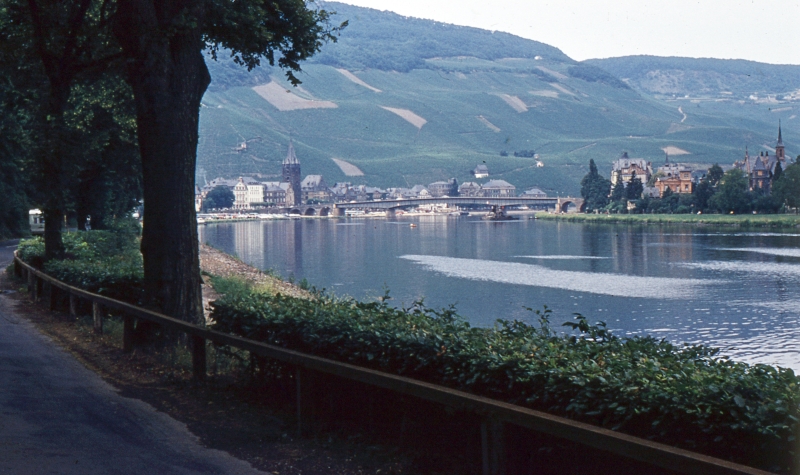
Famous Moselle Valley with Germany’s finest Vineyards
Dieter chortled a few times, before he retorted, “But my friend, don’t be an idiot. That is not the same as being physically present. When I kiss my beloved Heidi, I know real love, love that you cannot even fathom with your strange romantic ideas in your head.” And that was the beginning of a long discussion on the nature of love. When we had savoured the last drop of the wine and were ready to crawl into the tent, we had moved away from our opposite points of view and found some middle ground. We agreed that in order for a relationship to be meaningful both the physical and spiritual dimensions would have to be present. We learned something important from each other. As for me, I resolved to arrange a rendezvous with Biene at the first opportunity that would offer itself in the near future. But you never know to start with, how things turn out in the end.
Storm Clouds on the Horizon
In the meantime Biene had an exciting vacation with her family in Bavaria, often went paddling on Lake Ammer with her parents’ folding boat. She and her twin brother Walter almost drowned, when their boat capsized in a violent storm. They traveled to the German Alps and even took a gondola ride up to the Zugspitze, which is with an altitude of 3000 m the highest mountain in Germany. She returned home filled with wonderful memories. There was so much to tell, but the flow of letters began to ebb. The intervals between them began to widen into two-week gaps. Something must have happened that made me worry. Had my letters lost its fervour? Were the thoughts expressed too philosophical, self-centred, out of touch with reality? I could not tell.
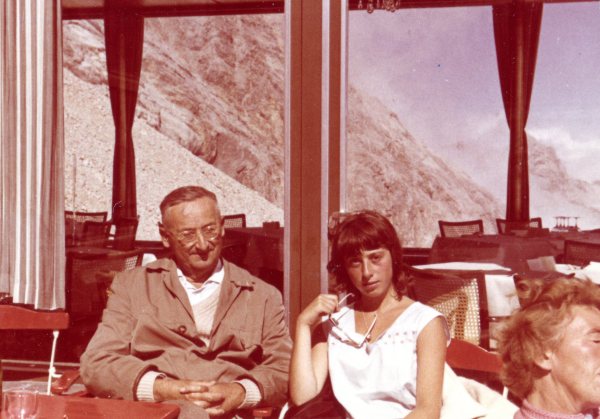
Biene and her father on the Zugspitze 1963
Fall was a beautiful time in Koblenz. The park at the German Corner, located at the confluence the Rivers Moselle and Rhine, was ablaze with brilliant red, yellow and orange colours. There I often sat on a park bench alone away from the noisy inner city and read about the fall and utter destruction of Rome’s rival Carthage in Mommsen’s History of Rome. I was fascinated to discover that the cause of the three Punic wars was the same as of most other conflicts in the history of mankind, namely the desire for economic power and growth at the expense of some other country. I gained important insights into the ways in which imperialistic expansions were intertwined with a general decay of the moral fibre of a nation. I saw so many parallels in our modern world that I contemplated writing a novella on the mighty city on the North African shore, if I could only add and weave in some personal experiences to the story to make it more interesting. These experiences were coming my way faster than expected, and in the end I got more than I had bargained for. Indeed I would have preferred not to write the novella in exchange for the pleasant status quo.

Deutsches Eck in Koblenz, Germany – Photo Credit: wikipedia.org
I had just settled into the routine of orderly army life with its duties of monthly night watches, sessions of theoretical and practical instructions and the occasional maneuvers, which I enjoyed more and more, because they took place in the great outdoors away from the stuffy barracks in the city. Then a command from the newly formed signal corps at Maxhof in Bavaria went out to all army divisions to provide two truck drivers each. Our crafty commanding officer in Koblenz selected private Gauke and me for the transfer effective October 1st, even though we had no driver’s license for those colossal Mercedes communications trucks. Obviously, he wanted to keep his precious truck drivers for himself. We were told that we would receive professional training and certification that could be very useful later on, when we returned to civilian life. However, it was immediately clear to my that with the transfer to Maxhof, I would lose out on the chance of becoming part of the upcoming officer’s training program. It would upon successful completion raise me to the rank of a lieutenant of the reserve with a much higher pay-out at the end of my two-year term. The wheels had been set in motion. I had no recourse to an appeal process. The decision was final. I was devastated.
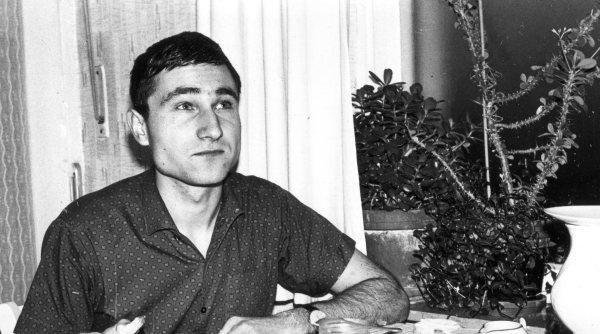
Peter in a contemplative mood at home in Watzenborn-Steinberg
One Misfortune Never Comes Alone
I was still reeling under the blow of the unexpected military transfer to Maxhof, Bavaria, when another one hit me like a bolt out of the blue. Biene wrote that she had met a young Dutch man by the name of Henk, to whom she was now engaged. They were dreaming about their own home at the edge of a forest near the city of Arnhem and were planning to get married. The news nearly tore me apart, all the more as Biene described our relationship as merely a nice correspondence between friends. Although my emotions were running high, I immediately responded to her letter and thanked her for being honest. It was a miracle of sort that I agreed to keep writing her. That promise was so terribly out of character, so contrary to what my pride and sense of honour would have allowed me to do that there was only one explanation. I was still in love with her.
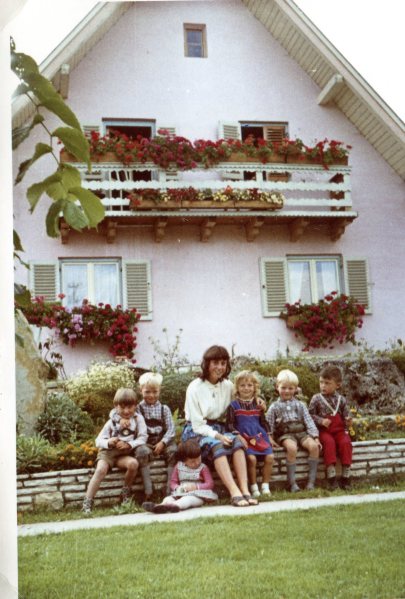
Biene on Vacation at Lake Ammer 1963
Sleepless nights followed. I held endless conversations with myself. At times I would place the entire blame on my shoulders. Dieter was perhaps right, when he said that a kiss is more powerful than words, passion stronger than tender sentiments expressed merely in letters. Then the American folk song ‘On Top of Old Smokey’ was going through my mind during those agonizing hours of wakefulness. The apparent truth of the line ‘I lost my true lover for courting too slow’ hit me especially hard. Suddenly the pendulum swung into the opposite direction. For a short while, I found relief by putting the blame on Biene. ‘Surely, one does not get engaged overnight’, I argued. ‘Why didn’t she write me sooner? Why did she allow the correspondence to drag on so long? What about her other pen pals, the young man from Morocco for example? Does she want to keep all her options open? Is she like a bee, as her name implies, flying in a kind of romantic dance from flower to flower to see where she would find the sweetest nectar?’ Having experienced both ends of the emotional spectrum, I finally settled for a more balanced view. The wildly swinging pendulum was coming to rest in the middle. Concern for Biene pushed anger and jealousy aside; she might have responded to the lure of marital bliss too quickly. These internal monologues went on and on through several nights, at the end of which I was completely exhausted. But I had calmed down enough to finish my letter to Biene with the words, “Just one thing you must promise me. If you perceive a danger for your happiness in that you cannot distinguish between true friendship and love between a man and a woman or if your future husband does not like our correspondence, then have the courage to say goodbye. For I do not want to destroy your happiness.”

Frauenkirche, Munich, Bavaria – Photo Credit: wikipedia.org
With my Phillips tape recorder in one hand and a heavy suitcase in the other, train tickets and army papers in my wallet, I stepped on the Intercity train to Munich. Private Gauke, whose first name I no longer recall, accompanied me to our destination. We were both in uniform, as this was a requirement when traveling on official assignments. While the high-speed electric train was rushing toward the Bavarian capital, Gauke tried to cheer me up by pointing out all the advantages of the prestigious truck driver’s license later in civilian life. But he succeeded only partly in pulling me out of my morose taciturn shell. He did not yet know about the other problem, for which the possession of a driver’s license offered no solution. In Munich we had to catch a local train to Starnberg. Thousands of passengers were milling about the main station. At the crowded automated billboard announcing arrival and departure times I spotted the wrinkled face of my former scout leader, Günther von A. He was as surprised to see me, as I was to see him. What were the chances of this occurring? Once in a million or less. And what were the chances of still being in love with Biene? The question made me think about fate and destiny, a topic that philosophers and theologians great and small have been grappling with for centuries, a can of worms, which I decided in my present state of mind to leave unopened.
Army Heaven

Lake Starnberg, Bavaria – Photo Credit: bavaria.by
Maxhof, a modern army training centre, was a pleasant surprise to me. In contrast to the drab sameness of the 19th century design of the Falckenstein barracks, Maxhof impressed me with its pleasant appearance. It had more the looks of a hypermodern youth hostel than of a military building complex. Trees and ornamental shrubs surrounded the sleeping quarters, the cafeteria, and the administration building. There were even flowerbeds at the main entrance. Best of all was the room, where we were going to sleep. With its comfortable beds, its large windows with a view from the park-like setting all the way up to the nearby mountains, its brightly painted walls, a spacious desk for Gauke and me, all I needed was Mother’s fancy tablecloth, a vase with some pretty fall flowers to have the illusion of being at home.

Maxhof with Lake Starnberg in the background
Gauke and I reported for duty the following morning at the main building. There was a momentary kafuffle over us two soldiers from Koblenz. Apparently the officer in charge of the transfer was supposed to have provided certified truck drivers. The officer behind the counter was very much upset over being cheated out of two valuable experienced drivers. But in the end he assigned us to a driving instructor and informed us to show up for our lessons the very next morning. Gauke and I could hardly show restraint in our ecstatic joy over this most fortunate turn of events. Apart from our first positive impressions about the physical surroundings we noticed with glee that there were no mandatory line-ups, no check-ups of room, closet, and clothes; this was army heaven.

Massive Mercedes truck – the type we were trained on
After two weeks of enjoyable driving lessons on the big Mercedes trucks, the compass needle of my inner life was no longer spinning out of control. More than three weeks had passed by now. Biene had not yet responded to my letter and I thought that if our correspondence was to end it should at least end on a good note. So I wrote,” … A relationship, no matter how you look at it, which had so beautifully and lovingly developed, is not the kind that we just break off. Something of that, which we shared, will remain open and will eat forever at our hearts. Therefore, I would like to amiably end, what we have so amiably started. Let us if not in reality then at least symbolically shake hands and without any bitter feelings part from each other. I am thankful for all the dear letters and I tell you once more that you have given me much during the time of inner trouble and distress. Please do not turn down my last request, dear Biene, and write to me just one more time. One last sign from you, and I will be content…”
But there was no sign, and I was not content.
Destruction of Ancient Carthage
A Metaphor for Emotional Turmoil
There was enough explosive emotional energy bottled up inside me. Having no one to write to, I had to return to the unfinished novella to release it. At the park bench near the German Corner in Koblenz I had most of its content on Carthage written up in my notebook. The personal experiences making the story come alive were missing though. Now they were burning with a searing fire in my heart. My fingers were itching to commit them to paper.

Ancient Carthage – Image Credit: ancient.eu
Our driving lessons had unexpectedly ended. We were told that the instructor was needed elsewhere and we would start over together with the next batch of soldiers coming in to render the course more efficient. Gauke and I were delegated to work in the office. The assignment was to catalog the total electronic equipment with all its individual parts down to the last nut and bolt. Thus, we created a giant database for the signal corps stationed at Maxhof. I dictated the names and parts numbers and Gauke typed. One can hardly imagine anything more boring than this. But there was one advantage. We only worked during regular office hours, and we were done with our daily chores of number crunching by 4:30 p.m.
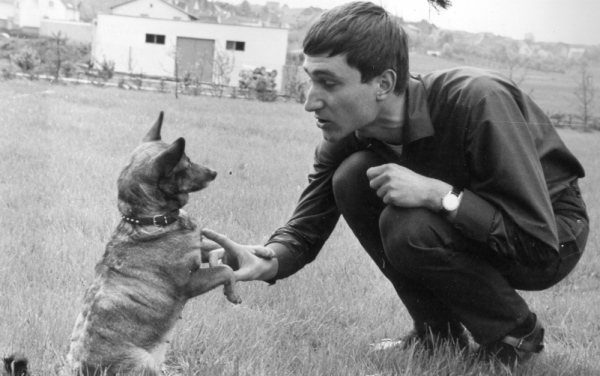
Peter playing with the neighbor’s dog (1963)
So I had more time than ever before to write in the semi-private room of our Maxhof residence. The historical sections of the novella heavily leaned on Mommsen’s historical work ‘History of Rome’ and to the best of my knowledge they described the power politics and Machiavellian schemes of Rome very accurately. My heart, which had lost two girlfriends within the span of less than six months, was the fertile breeding ground for the stuff that good writing feeds on. I transformed my former pen pal Margret, into Bersika, the daughter of a wealthy member of the Peace Party of Carthage to make the final dramatic encounter in the burning capital of the Carthaginians more believable. On the other hand, Claudia (Biene) and her twin brother received a more realistic description reflecting our first encounter at Lake Baldeney and the ensuing correspondence, which had ended so painfully. On the Palatine Hill in Rome Publius (Peter) and his friend became acquainted with an old sage, who introduced the young men to the philosophical centre piece of the novel, which reflected my ideas, in part burrowed from Democritus, on God and His creation and how He lives within it in a mysterious interplay between mind and matter. The destruction of Carthage, the fierce house to house street fighting, the slaughter of tens of thousands of civilians, the senseless resistance of the dictatorial ruling party against the almighty Roman war machine, the burning houses, the stench of unburied corpses provided the background for the final scene symbolizing my chaotic troublesome state of mind.
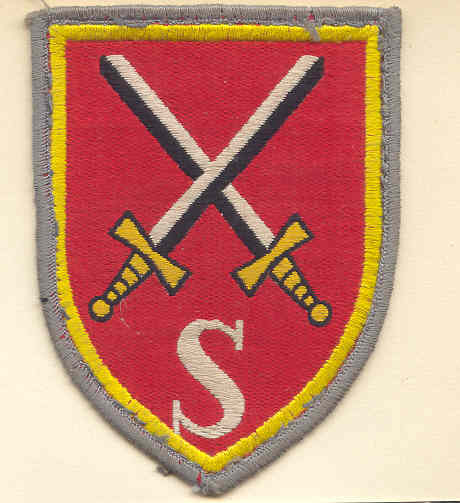
Crest of the Signal Corps
When I had penned the last line, I felt an eerie calm come over me. For a while I sat at my desk without a thought, without a feeling; it seemed that my inner being had been poured out into the thick writing book before me. Private Gauke entered the room. He had been teasing me about my writing craze for the past couple of weeks and had noticed with genuine concern how I was withdrawing more and more into my crusty shell. He said, “Peter, it is about time that you get off your chair. I just discovered a cozy pub in Feldafing. Let’s go and have a drink of that great Bavarian beer.” Gauke was a fine fellow. I gladly came along. The novella was finished.
New Year’s Eve Party
Chief Günther Kegler provides some much needed distraction
The stupendous outpour of pent-up emotions alleviated the anger and the pain. I began to enjoy the almost daily outings with my friend Gauke. But in spite of the pleasant distractions the visits to the pubs provided by the excellent beer, wholesome food, Bavarian music in the background, and the pretty waitresses in their traditional dirndls, I could not push the troubling spectre of my lost love out of my mind. I had asked her for a farewell letter or card to end amiably what had started amiably. Two months had passed. The silence became unbearable. So against my own conviction like a moth attracted to the flame of a burning candle I wrote her another letter from home before Christmas, in which I reiterated how much I appreciated her supportive letters during the hard days of my basic training, Then all of a sudden as if triggered by the emotionally cry of despair on the last pages of my novella, I let the proverbial cat out of the bag, “… Add to that the devastating fantasy, which produced during our correspondence the strangest imaginary flowers. At times I saw you – please don’t be alarmed, dear Biene – in my arms, then at my side travel to Canada, study with me in Marburg or Berlin, and in the more distant, but all the more brighter future spend a life with you through joy and sorrow. All these fantasies essentially destroyed our relationship…”
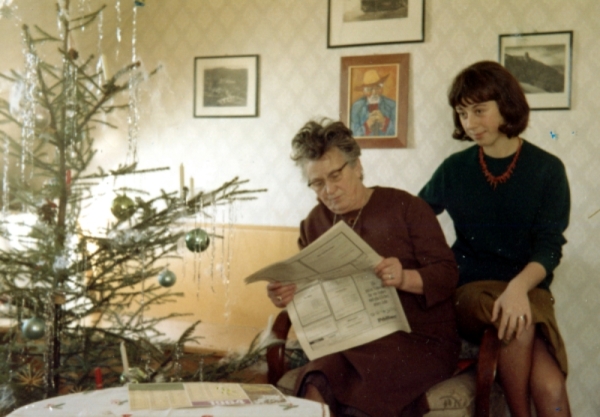
Biene (Gertrud) and her mother Elisabeth Panknin – Christmas 1963
Again I urged her to reply, even if she had no desire to write, just one more time. Before I sealed the envelope, I inserted a short story, which I had especially written for her. I hoped that it would in allegorical terms evoke the tender feelings we had once felt for one another. I did not mention the novella, which as an unedited rough copy I did not yet consider complete. Within three days and just in time for Christmas a miracle occurred. The letter that I no longer expected, but had hoped for arrived. And what it contained surpassed all my expectations. Instead of a farewell message, she wrote that my story about little Irwin had moved her to tears, but more importantly that she had once entertained similar thoughts and dreamed similar dreams about the two of us living a life time together. Even though she too had also allowed her fantasy to go too far and expressed doubts about the fickle nature of dreams, which often do not bring the fulfillment one had longed for. She placed her trust in the mysterious force called Fate that one day things would work out between the two of us. The way she was wording her sentences I sensed that she had gone through some troublesome times during that long period of silence in our correspondence. Some way or another the anguish was connected to her fiancé Henk, whose father had suddenly and unexpectedly passed away. Nevertheless the news that our friendship at least at the correspondence level had been restored gave me a big boost.
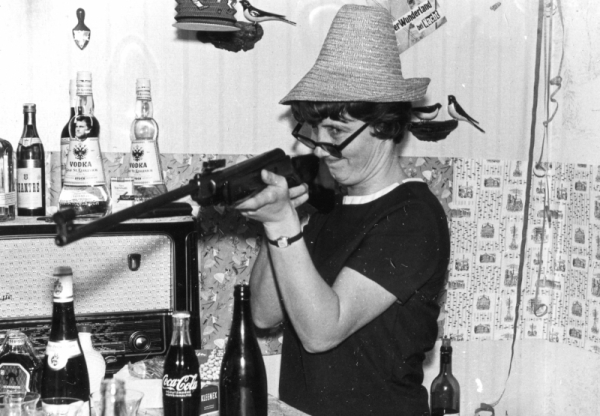
Helga Kegler – daughter of General Gerhard Kegler
I participated eagerly in the preparations for the New Year’s family party planned by the ‘chief’ of the Kegler clan, Uncle Günther. In the large vestibule of the basement suite we set up a bar, which we dubbed the Flamingo Bar. The good uncle had it well stocked with choice wine and beer as well as nonalcoholic drinks for this festive occasion. We decorated the wall with pictures, photos and old movie posters. I even contributed my painting of the 21st century space woman now looking down on a happy party crowd. Happy and diverse indeed was the crowd ringing in the New Year, young and old celebrating in perfect harmony, Uncle Günther, Aunt Lucie, Mother and Aunt Mieze, Adolf, Erika, my cousins Helga and Jutta, two young ladies, the daughters of a pastor’s couple, whose names I can no longer recall, and my humble self. My tape recorder provided the background music for the party, and whenever there was a call for a dance I cranked up the volume and switched the music to a livelier beat.
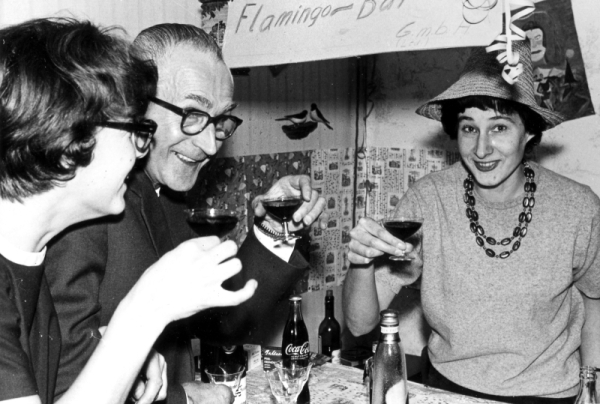
From left to right: Helga, Uncle Günther, and my sister Eka (Lavana)
At midnight we raised and clinked our champagne glasses wishing each other a Happy New Year. With Biene’s letter tucked away in my suit pocket I looked with confidence into the future. I felt that 1964 was going to be a great year for me. However, if I had read Goethe’s autobiographical novel ‘The Sorrows of Young Werther’ and understood how I, like Werther, was also entangled in a love triangle, I would have been less optimistic. The frayed thread on which our love was hanging was ready to snap any time. Whether I would have shot a bullet through my brain on a night watch in the army, if Biene had married Henk, was doubtful. Eventually I would have found and married another girl. But the oppressive awareness of having lost my first love would have lingered on my consciousness for the rest of my life.
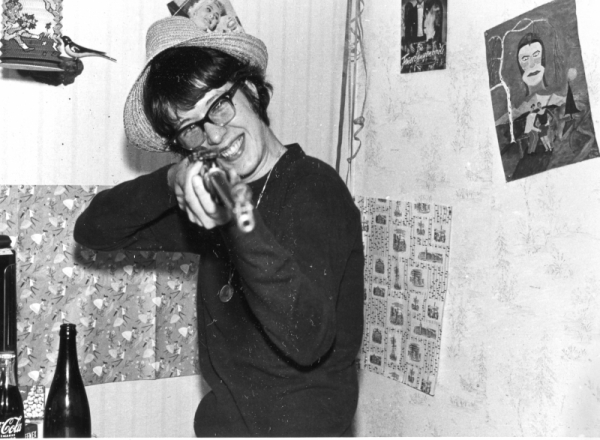
Jutta Kegler – Youngest daughter of General Gerhard Kegler
